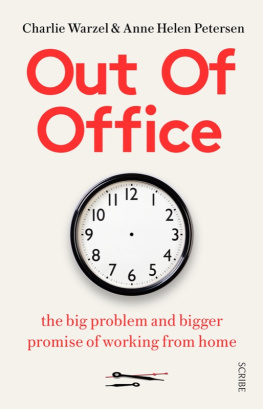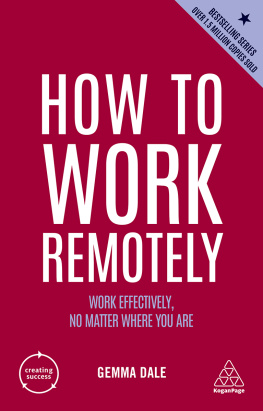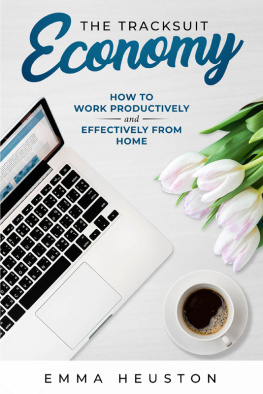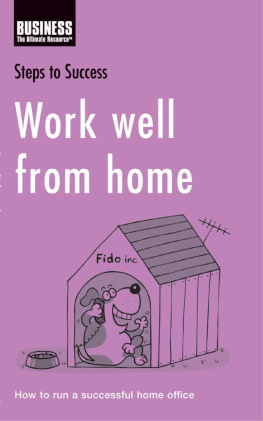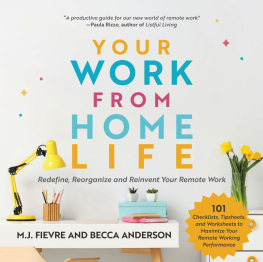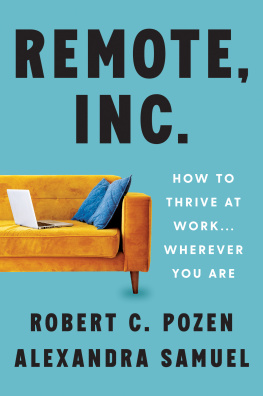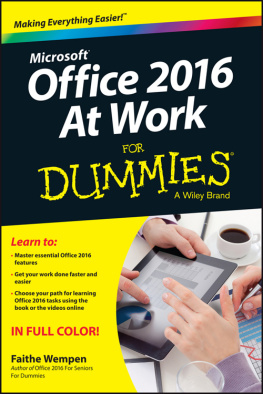
Out of Office
Anne Helen Petersen is an American writer and journalist based in Missoula, Montana. She worked as a Senior Culture Writer for Buzzfeed until 2020 when she began writing a newsletter for subscribers at Substack. A former academic, Petersen received her PhD at the University of Texas at Austin. She is the author of three previous books, including Cant Even: how millennials became the burnout generation (2021).
Based in Missoula, Montana, Charlie Warzel became a New York Times opinion writer at large in 2019. Before that, he was a senior technology writer at BuzzFeed News. He has been a technology writer for Adweek magazine and a producer at NBC News.
Scribe Publications
1820 Edward St, Brunswick, Victoria 3056, Australia
2 John St, Clerkenwell, London, WC1N 2ES, United Kingdom
Published by arrangement with Alfred A. Knopf, an imprint of Knopf Doubleday Publishing Group, a division of Penguin Random House LLC
Published by Scribe 2022
Copyright Anne Helen Petersen and Charlie Warzel
All rights reserved. Without limiting the rights under copyright reserved above, no part of this publication may be reproduced, stored in or introduced into a retrieval system, or transmitted, in any form or by any means (electronic, mechanical, photocopying, recording or otherwise) without the prior written permission of the publishers of this book.
The moral rights of the authors have been asserted.
Scribe acknowledges Australias First Nations peoples as the traditional owners and custodians of this country, and we pay our respects to their elders, past and present.
978 1 922310 88 0 (Australian edition)
978 1 913348 78 6 (UK edition)
978 1 925938 99 9 (ebook)
Catalogue records for this book are available from the National Library of Australia and the British Library.
scribepublications.com.au
scribepublications.co.uk
Contents
Introduction
W hatever you were doing during the pandemic and its stilted aftermath, it was not working from home.
Bullshit, you might say, remembering all those times you sat in a makeshift office in your bedroom, haphazardly constructed so that it might look semiprofessional over Zoom calls. If youre one of the roughly 42 percent of Americans who were able to work remotely during the pandemic, you likely spent most of the time chained to a screen in your home clocking in each morning. You were, quite literally, doing your job from home.
But you werent working from home. You were laboring in confinement and under duress. Others have described it as living at work. You were frantically tapping out an email while trying to make lunch and supervise distance learning. You were stuck alone in a cramped apartment for weeks, unable to see friends or family, exhausted, and managing a level of stress you didnt know was possible. Work became life, and life became work. You werent thriving. You were surviving.
Heres the nightmare scenario: this could be the remote future. Until recently, broad implementation of work from home seemed more like a thought experiment in the pages of Harvard Business Review than an idea that might work in practice. But the pandemic forced millions into remote work, and companies got curious. For a CFO, the prospect of getting that expensive downtown real estate off the balance sheet is enticing, especially if you factor in cost-of-living decreases when employees move out of high-cost cities. And then theres the efficiency: no more commutes means more time to answer emails! Some of the biggest companies in the world have already made remote work an option for the foreseeable future, which, as with almost any business decision, means they think it could be good for the bottom line. And their cost savings will be shouldered by you.
This is the dark truth of remote work as we know it now: it promises to liberate workers from the chains of the office, but in practice it capitalizes on the total collapse of work-life balance.
We know this from experience. In 2017, we made the case that we could do our jobs as reporters even better from outside the city. We packed our car in Brooklyn and made the transition to working from home in Montana after more than a decade of office life. Annemore organized, a bit more introverted by naturesettled right in. Before journalism, shed been an academic and a professor; going to the office always felt weirder, more compulsory, than working from your kitchen table. But the flexibility of academic lifeand now journalistic lifereally just meant flexibility to work all the time. Dreams of daily hikes in the mountains quickly evaporated. She was working just as much as, if not more than, she did in New York. The backdrop was just more beautiful.
Charlie loves to bullshit with people in the office. He cant manage his calendar to save his life. He thrives on interaction. And he struggled immediately. The first few months were disorienting and grueling. He spent so much time frantically writing, emailing, and staying in constant contact via Slack messages from the couch that when hed sit back down at night to unwind, hed break into a cold sweat. Working relentlessly from home crossed his wires; his mind and body were unable to understand why he was both at the office and mainlining Netflix.
Charlie was absolutely convinced the move would hurt his career. Hed be isolated, invisible to superiors, and overlooked for assignments. He worried he was becoming untethered from his work, that hed lost those spontaneous encounters and conversations that sparked new ideas. So he worked obsessively, with his bosses reaping the rewards, even if they didnt know it. Work on weekends? Why not? After all, he was already at the office. No commute didnt mean free time in the mornings and evenings; it meant rolling out of bed and grabbing the phone and punching the clock. He was writing more than ever, but he started burning out every few weeks, desperate for any activity that would help demarcate work from leisure.
Something had to change. In order to make working from home sustainableyears before the pandemic hitwe had to figure out a way to cultivate a rich home life and then fit our jobs into that space, not the other way around. That meant disconnecting more, but it also meant changing the rhythms of our days and doing away with the rigidity beaten into us by the modern workplace.
Once we made those changes, the lesson was immediately clear: offices can be bullies. They force us to orient our days around commutes. They commandeer our attention with (sometimes enjoyable!) unscheduled, drive-by meetings. They elevate the feeling of productivity over being productive. Theyre a breeding ground for microaggressions and toxic loops of hierarchical behavior. Its no surprise that people who thrive in the office are almost always the same people who have accumulated or were raised with a lot of identity-related privilege outside it.
Working from home can be a meaningful act of control and resistance. But its also not a cure-all. It cant promise to fix the rot at the core of modern capitalism. All of the toxic dynamics listed above can be ported over to the remote work world. This is especially true if you or your company conceives of working from home as everything that used to happen at the office, only now youre the one paying the rent and utilities. The goal of this book, then, is to think through how we can liberate ourselves from the most toxic, alienating, and frustrating aspects of office work. Not just by shifting the location where the work is completed, but also by rethinking the work we do and the time we allot to it.
This book isnt a how-to manual. It isnt self-help, at least not in the traditional way we think of it. We dont profess to have anything figured out. Balancing work and life continues to be a struggle for us, and we fail all the time, in part because we do find satisfaction in our jobs. This book is also specifically focused on and addressed to the 42 percent of workers whose jobs can be done remotely: far from universal. But for that 42 percent (and growing), we are trying to figure out whats broken about the thing that takes up so much of our waking hours and begin to try to fix it.
Next page
